Selecting the best LLM tools is critical for building a reliable test automation strategy. With the rapid advances in AI test automation, teams can now automate complex tasks, such as unit testing, integration testing, functional testing, and regression testing, more efficiently. The right test automation tools combined with LLM fine-tuning tools, LLM observability tools, and LLM security tools can significantly improve software quality and speed.

Whether you need automated functional testing, software regression testing, or robust system integration testing, choosing the ideal LLM tools ensures your software test automation processes are scalable, accurate, and ready for modern development environments.
What’s next? Keep scrolling to find out:
🚀 LLM Tools for Smarter Testing: Understand how LLMs automate and enhance software test processes.
🚀 Industries Leveraging LLMs: Explore which sectors gain the most from LLM-powered test automation.
🚀 Challenges Without LLMs: Identify the pain points of traditional test automation approaches.
🚀 LLM for Test Data & Scripts: Learn how LLMs simplify test data creation, unit, and functional testing.
🚀 Integration Best Practices: Tips to align LLM tools with existing frameworks for maximum efficiency.
What Are LLM Tools for Test Automation?
LLM tools for test automation are AI-powered solutions designed to enhance the efficiency and accuracy of software testing processes. By integrating test automation frameworks with LLM tools, teams can automate repetitive tasks, reduce manual intervention, and improve test coverage. These tools leverage automated regression testing, unit testing frameworks, and automated integration testing to accelerate software delivery cycles.
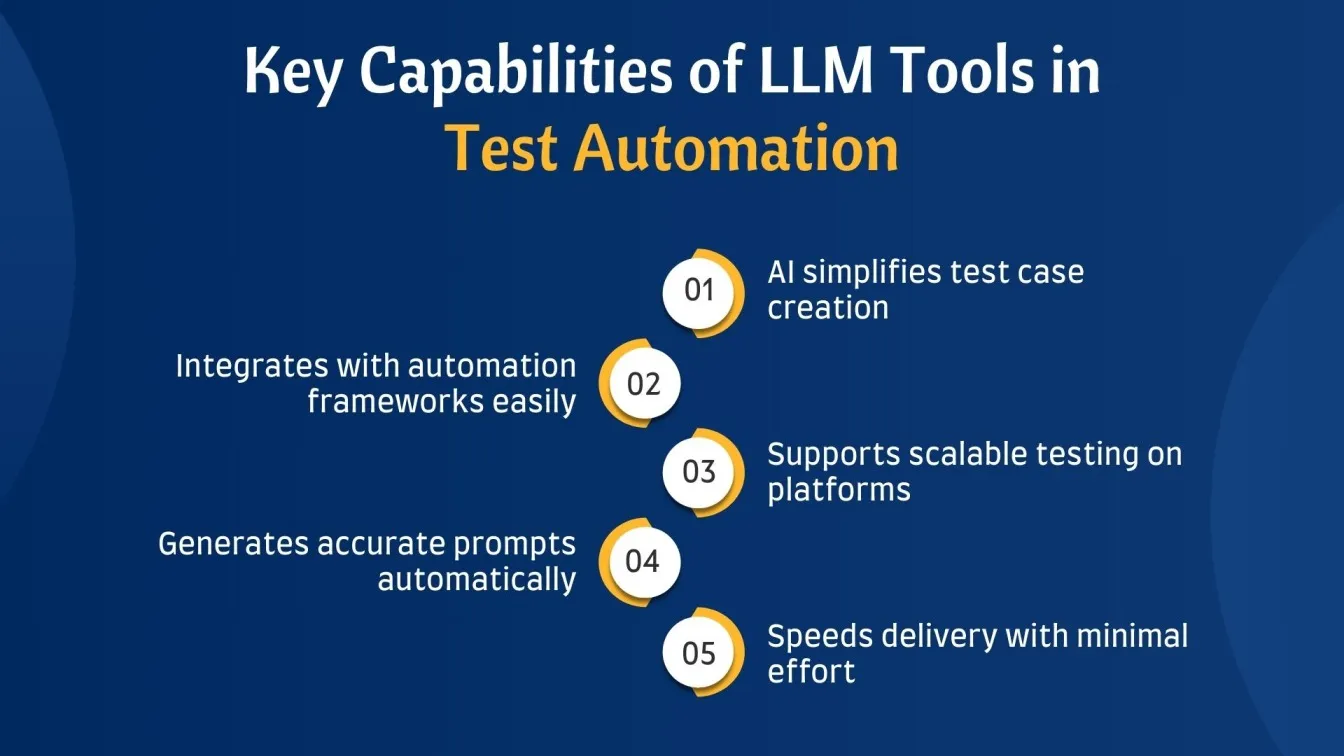
Here’s what makes LLM tools essential for test automation services:
- Enable faster and more reliable software functional testing with AI-generated test scenarios
- Simplify automated unit testing by generating code snippets and improving test cases
- Support automated functional testing for complex workflows in web and mobile applications
- Improve accuracy in regression testing automation to avoid breaking changes
- Enhance test data creation for api integration testing and system validation
- Reduce dependency on manual effort in software test automation
- Provide scalability for modern test automation solutions across diverse platforms
How LLM Tools Are Changing Software Testing
The rise of LLM tools is reshaping software testing by enhancing automation capabilities, reducing manual effort, and increasing overall testing efficiency across various environments.
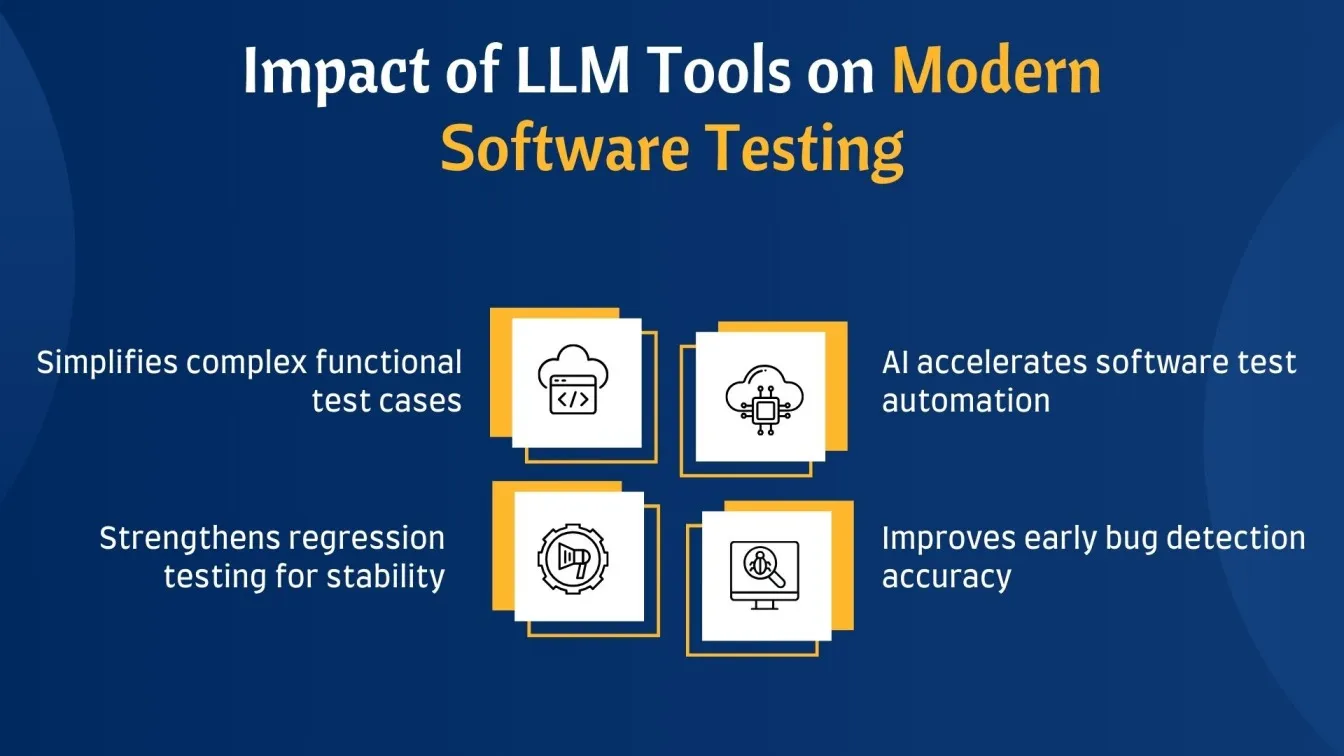
- Accelerating intelligent test automation: With the power of AI, teams can streamline repetitive tasks using advanced test automation tools, improving speed and accuracy.
- Boosting early bug detection: LLM tools assist in optimizing unit testing, helping detect defects during the development phase and improving overall software reliability.
- Enhancing functional validation: LLM-driven systems simplify complex functional testing processes, ensuring that software applications meet business requirements effectively.
- Simplifying system-level testing: By leveraging AI, organizations can improve system integration testing and api integration testing, reducing integration errors.
- Ensuring product stability: Automated regression testing powered by LLM tools minimizes the risk of introducing new bugs after updates or feature releases.
Industries That Benefit Most from LLM-Powered Test Automation
LLM-powered test automation is revolutionizing software quality by accelerating testing processes and boosting accuracy across various industries. These tools combine AI capabilities with robust test automation services to handle complex testing requirements efficiently.
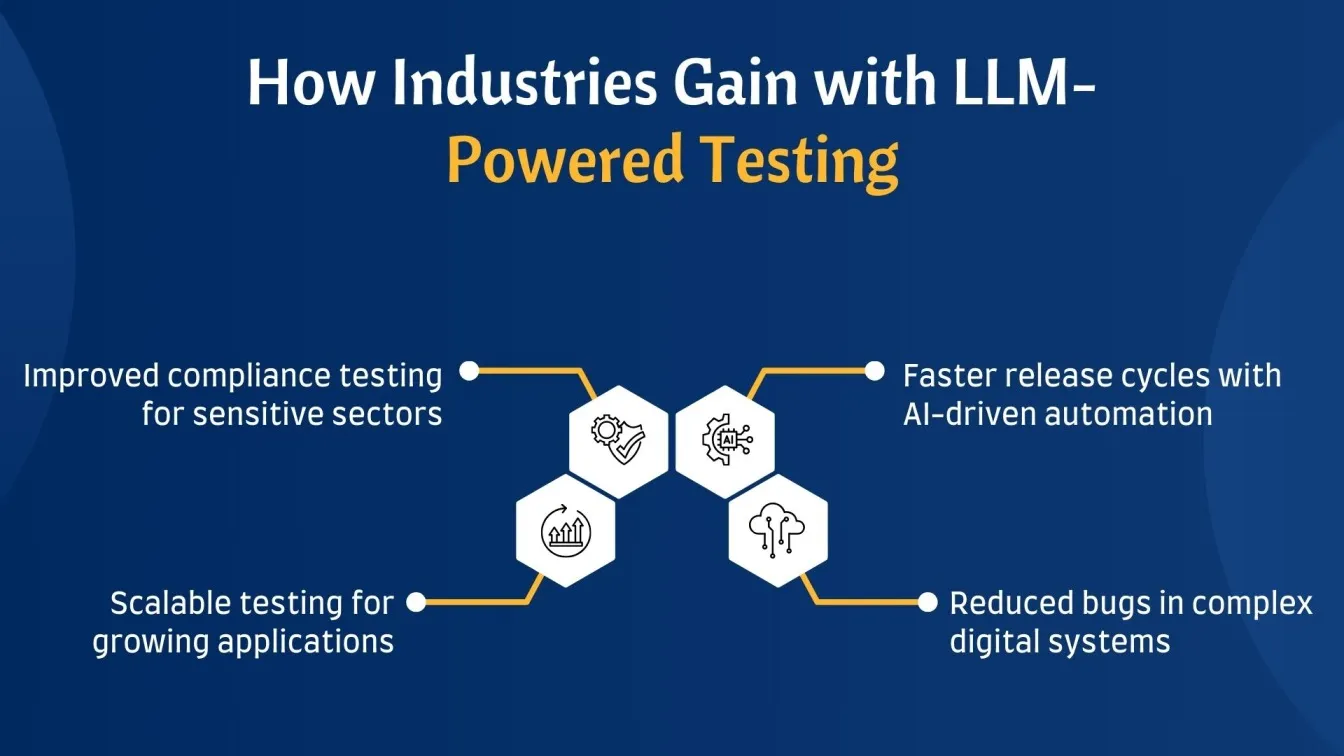
- Banking and Financial Services: With increasing demand for system integration testing, these industries use LLM tools to streamline secure transactions and automate compliance checks.
- Healthcare and Life Sciences: LLM solutions simplify software functional testing, ensuring healthcare applications meet safety and regulatory standards.
- E-commerce and Retail: Businesses leverage AI test automation for faster release cycles, improving customer experience across websites and mobile apps.
- Telecommunications: With rapid system upgrades, automated regression testing services help maintain quality and prevent disruptions.
- Technology and SaaS Companies: LLMs enhance automated unit testing processes, enabling quicker deployments and continuous delivery.
Common Challenges in Test Automation Without LLM Tools
Without advanced LLM tools, many test automation processes remain manual, repetitive, and error-prone. Traditional test automation frameworks often lack the adaptability needed to manage AI-driven systems, making quality assurance more complex. Below are key challenges organizations face:
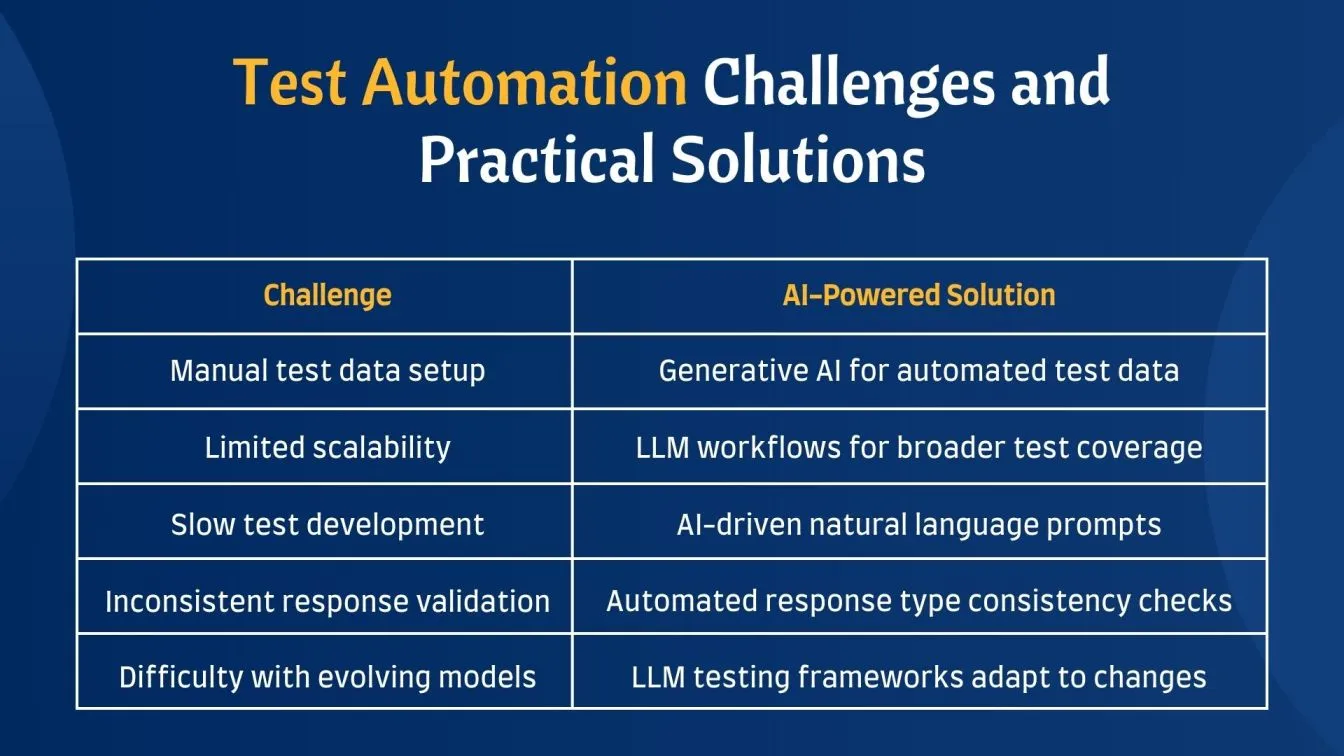
- Increased manual effort: QA teams must handle repetitive tasks like test data setup, response evaluation, and regression test verification without AI support.
- Scalability issues: Expanding automated testing without leveraging LLM workflows or generative AI limits coverage across complex applications.
- Time-consuming test development: Writing natural-language prompts, code suggestions, or integrating with Selenium automation testing becomes slower and inconsistent.
- Response quality inconsistencies: Ensuring response type consistency, factual accuracy, and maintaining API calls requires extensive manual checks.
- Difficulty managing model evolution: Without LLM testing frameworks, adapting to model versions, evolving training data, or content generation workflows becomes inefficient.
How LLM Tools Improve Test Script and Test Data Generation
Modern software teams rely on accurate test scripts and diverse test data to ensure reliable software releases. LLM tools enhance these processes using Natural Language Processing and AI-driven automation, helping streamline test automation efforts across CI/CD pipelines.
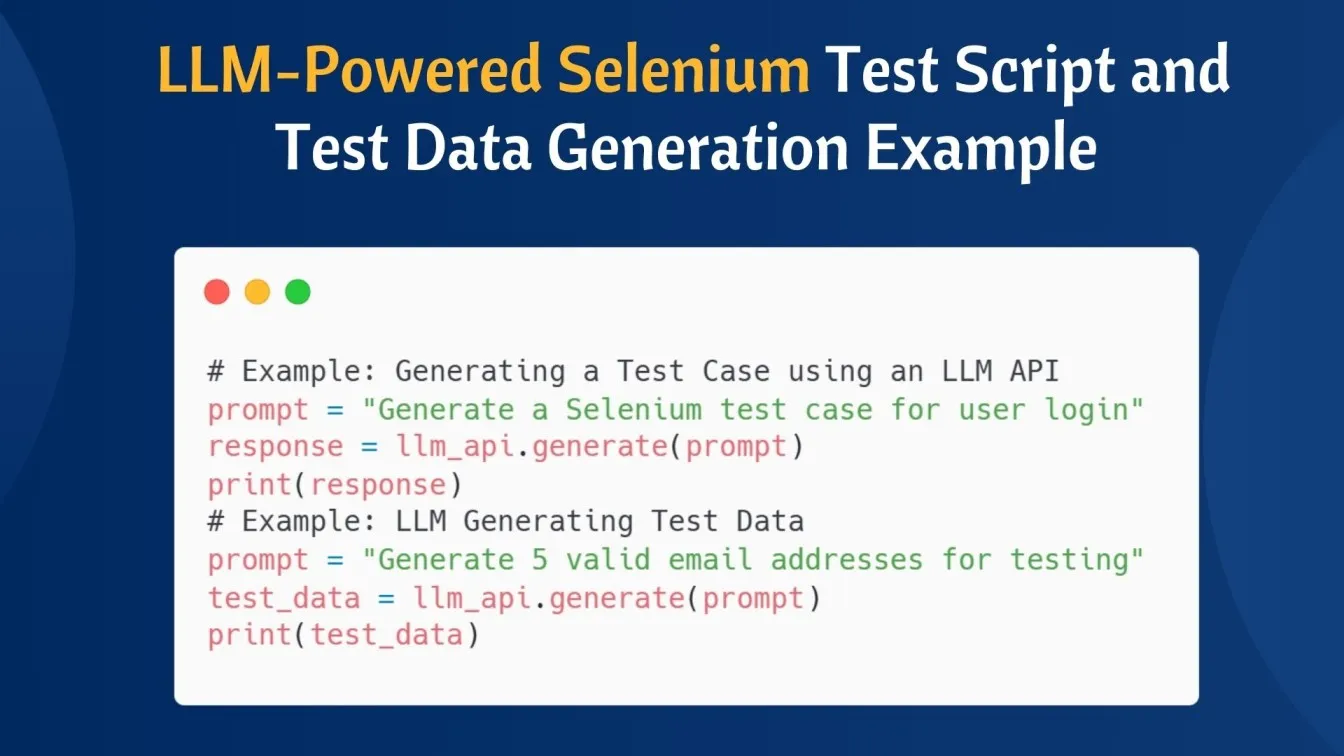
- Automated script creation: LLM tools simplify test script development by converting natural-language prompts into functional testing scripts for various test frameworks.
- Efficient test data setup: Generative AI produces realistic, diverse data samples for functional testing and performance testing without manual effort.
- Enhanced API testing: Automated API calls and function calls become faster and more reliable with AI agents assisting in test generation.
- Factual accuracy validation: Test data incorporates ground truth and model prediction accuracy checks to reduce test failures.
- Support for evolving models: As LLM developers fine-tune LLMs or update model size, test scripts adapt automatically, improving response quality and consistency.
Using LLM Tools for Unit Testing Activities
Unit testing plays a crucial role in validating individual components of an application. By leveraging LLM tools, teams can automate unit tests with greater efficiency, ensuring improved software functional testing and reducing manual effort in software regression testing processes.
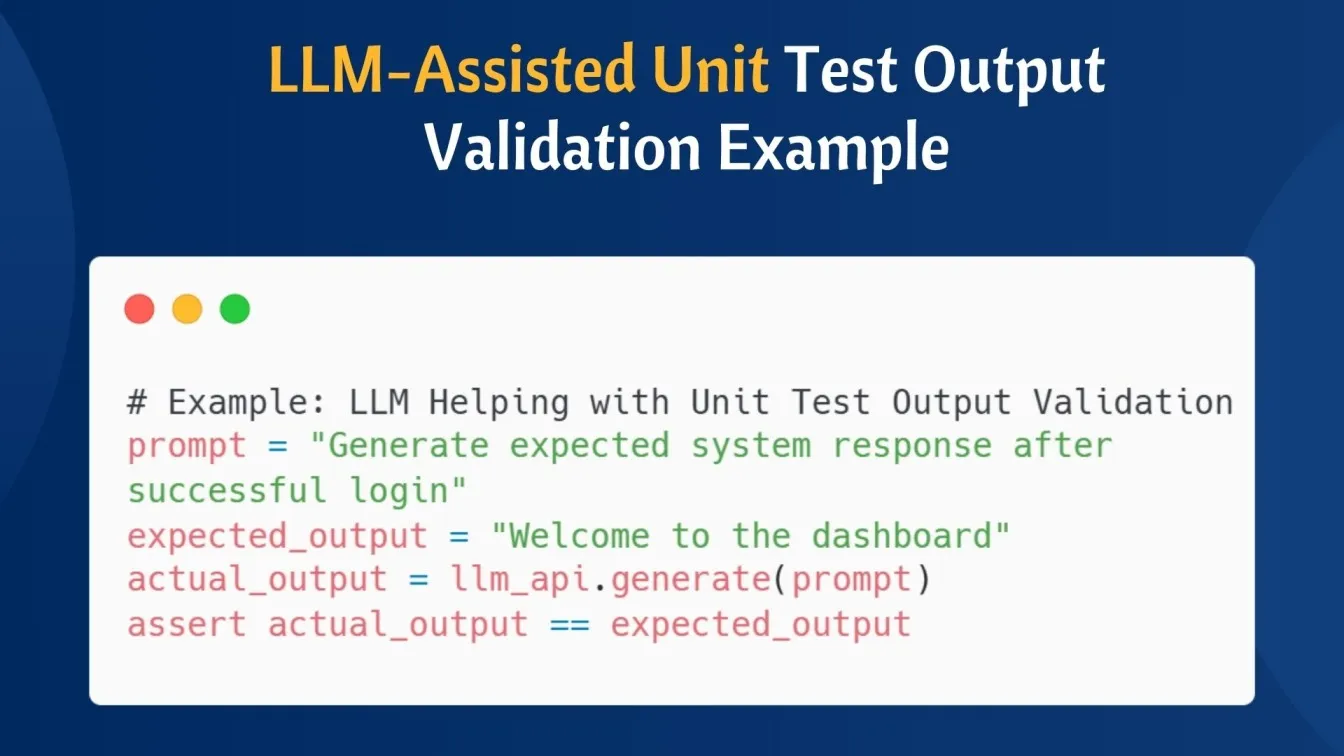
- AI-driven test case generation: LLM tools use retrieval-augmented generation and prompt engineering to quickly generate unit tests based on existing code and project requirements.
- Response evaluation automation: These tools assess response type consistency and factual accuracy in unit testing, improving overall code quality.
- Seamless integration with frameworks: LLM testing frameworks support popular unit testing tools like Selenium automation testing and automated integration testing, enhancing CI/CD pipelines.
- Accelerated feedback for QA teams: LLM workflows enable real-time response evaluation, ensuring model-centric evaluation aligns with expected outcomes.
- Support for code suggestions: Generative AI within LLM tools provides smart code suggestions during unit test creation, reducing errors and boosting test automation productivity.
Using LLM Tools for Functional Testing Processes
LLM tools are transforming how organizations execute functional testing by improving accuracy, enhancing efficiency, and reducing manual effort. These tools play a significant role in software functional testing, especially for modern AI-driven applications where reliable outputs are critical for customer support and system stability.
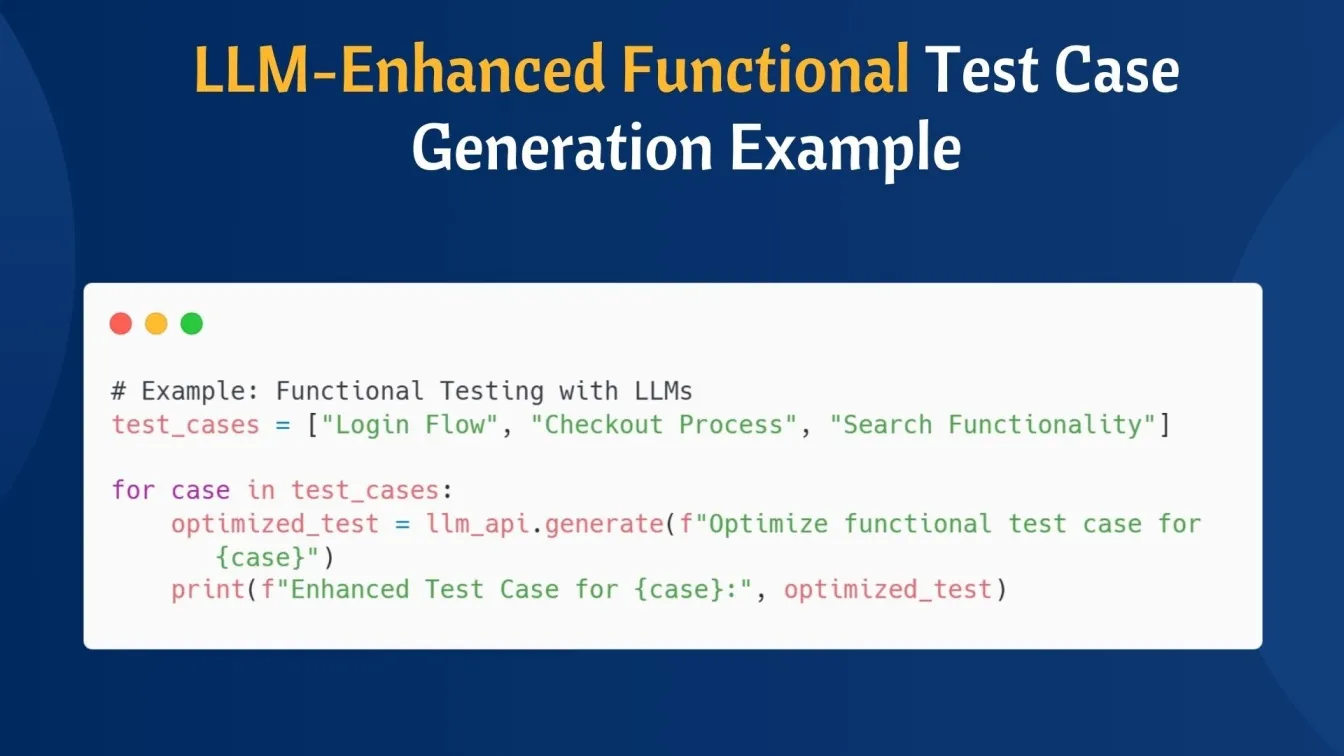
- Data quality enhancement: Large Language Models improve test data setup by generating realistic, high-quality datasets for functional testing processes.
- Automated content creation: LLM tools assist in building functional test scripts and documentation, simplifying software test automation for development teams.
- Regular expressions optimization: By leveraging natural-language prompts, LLM developers can automate complex pattern matching during functional testing in software testing.
- Fine-Tuning LLMs for accuracy: Functional testing ensures that fine-tuned models maintain response quality, reducing risks of system failures.
- Real-time monitoring and evaluation tools: LLM workflows integrate evaluation tools and real-time monitoring to maintain functionality standards in production.
- Stack Overflow-style support: AI agents powered by LLM tools offer troubleshooting insights during functional testing, enhancing customer support efficiency.
Best Practices for Integrating LLM Tools with Existing Frameworks
Integrating Large Language Models into your existing test automation strategy can unlock advanced efficiency. To maximize success, it’s essential to align LLM tools with proven software testing practices and modern frameworks.
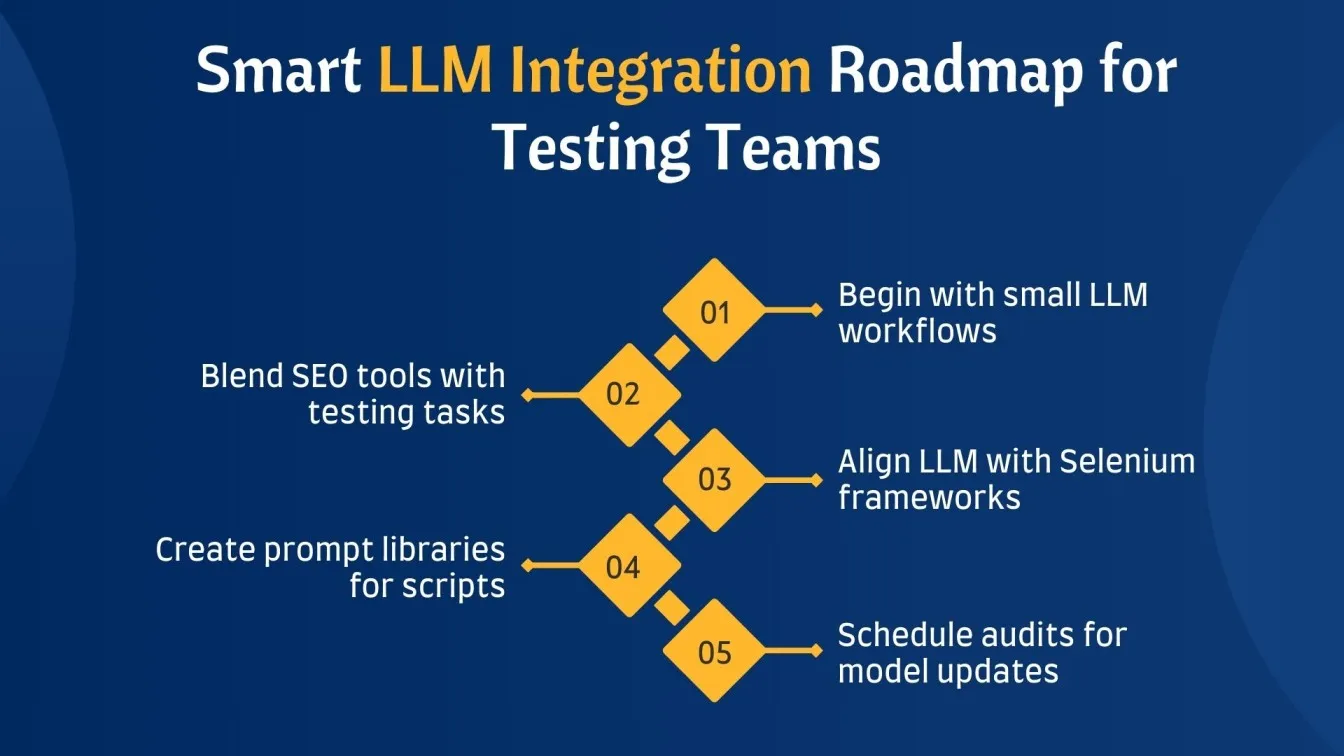
- Framework Compatibility: Ensure LLM tools integrate smoothly with Selenium test automation and other test automation tools.
- SEO Content Creation: Utilize LLM SEO tools to auto-generate optimized test scripts and documentation.
- Functional Testing Support: Combine LLM tools with functional testing tools for improved functional and non functional testing coverage.
- Regression Optimization: Enhance regression testing tools with LLM-driven automation for faster test cycles.
- Integration Flexibility: Use LLM tools to support different types of integration testing across varied environments.
- Unit Testing Alignment: Incorporate LLM capabilities to strengthen software unit testing and improve test accuracy.
Final Thoughts
LLM tools are reshaping test automation by boosting efficiency, accuracy, and scalability across software development. From generating quality test data to enhancing unit testing and functional testing processes, they help QA teams streamline complex workflows. By selecting the right LLM tools aligned with your test automation strategy, you can achieve faster releases, reliable results, and smarter AI-driven testing, ensuring your software meets modern performance and quality standards.

Frugal Testing is emerging as a trusted software testing service provider, known for affordable solutions like functional testing services, bug testing services, and Selenium automation testing services. As one of the top software testing companies in USA, their expertise extends to AI-driven test automation services and cloud-based test automation services. With frugaltesting.com, businesses access reliable testing, ensuring software quality while maintaining cost efficiency for both startups and enterprises.
People Also Ask
1. Can LLM tools help reduce overall software testing costs?
Yes, by automating repetitive tasks and accelerating test cycles, LLM tools lower manual effort and long-term testing expenses.
2. How secure is it to use LLM tools in sensitive software environments?
With the help of LLM security tools and observability tools, organizations can maintain data privacy and implement secure testing in sensitive environments.
3. What role does real-time monitoring play in LLM-powered testing?
Real-time monitoring ensures test executions are tracked live, enabling faster identification of issues and maintaining software stability.
4. Can LLM tools adapt to changing project requirements?
LLM tools evolve in response to project needs, supporting new code updates, expanding test coverage, and reducing manual effort in the face of change.
5. Are LLM tools beneficial for cross-functional teams?
LLM tools simplify testing processes, allowing developers, testers, and business teams to collaborate effectively.





%201.webp)

